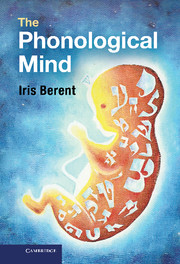Book contents
- Frontmatter
- Contents
- Figures
- Tables
- Copyright acknowledgements
- Preface
- Part I Introduction
- Part II Algebraic phonology
- Part III Universal design
- Part IV Ontogeny, phylogeny, phonological hardware, and technology
- 9 Out of the mouths of babes
- 10 The phonological mind evolves
- 11 The phonological brain
- 12 Phonological technologies: reading and writing
- 13 Conclusions, caveats, questions
- References
- Index
9 - Out of the mouths of babes
Published online by Cambridge University Press: 05 February 2013
- Frontmatter
- Contents
- Figures
- Tables
- Copyright acknowledgements
- Preface
- Part I Introduction
- Part II Algebraic phonology
- Part III Universal design
- Part IV Ontogeny, phylogeny, phonological hardware, and technology
- 9 Out of the mouths of babes
- 10 The phonological mind evolves
- 11 The phonological brain
- 12 Phonological technologies: reading and writing
- 13 Conclusions, caveats, questions
- References
- Index
Summary
Previous chapters have examined the hypothesis of core phonology by inspecting the phonological grammars of adult speakers. Core phonology, however, potentially encompasses not only mature phonological systems but also the initial state of the grammar. It is the early onset of core phonological knowledge that might form the scaffold for mature phonological systems by providing a universal set of primitives and combinatorial principles. In this chapter, we examine whether universal primitives and principles are in fact active in early phonological systems. We demonstrate that at birth, infants possess algebraic computational machinery commensurable with the algebraic powers of adult grammars. The phonological preferences of infants and young children are likewise consistent with several of the primitives and markedness constraints seen in adult phonological systems; some of those preferences extend to structures that are unattested in the child’s language, and a handful is documented in early infancy. While the available findings are insufficient to fully evaluate the core knowledge hypothesis, they are nonetheless consistent with this possibility.
The evidence presented in the previous chapters suggests that, by the time humans reach adulthood, they possess an algebraic phonological grammar, equipped with representations and constraints that are putatively universal. How do human adults converge on this shared phonological system?
The answer, according to the core knowledge hypothesis, is that people are innately equipped with core phonological knowledge. Core knowledge determines the initial state of the grammar (“the initial state”) and, together with experience and nonlinguistic constraints, it guides mature phonological systems to converge on a similar final state (“the final state of the grammar”). If this hypothesis were correct, then one would expect early phonological systems to exhibit shared primitives and constraints. In its strongest form, the hypothesis of core phonological knowledge would predict that the phonological grammar is fully formed at birth; a weaker version might assume a later onset; this weaker version places the genesis of the phonological grammar somewhere after birth, but before the acquisition of language-particular phonotactics, near the child’s first birthday. Regardless of its precise onset, both views assert that core phonological knowledge should be present early in life. In what follows, we test this hypothesis.
- Type
- Chapter
- Information
- The Phonological Mind , pp. 201 - 225Publisher: Cambridge University PressPrint publication year: 2013



